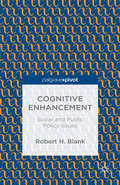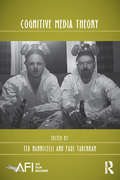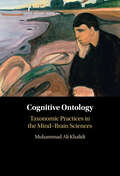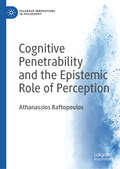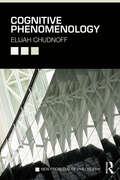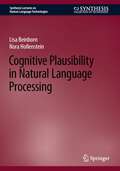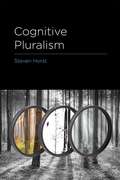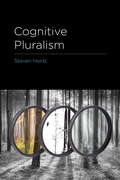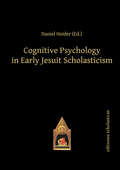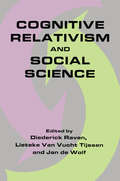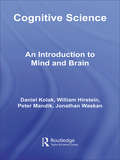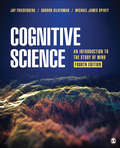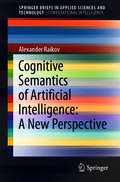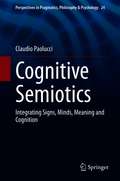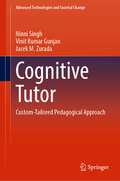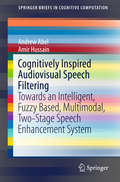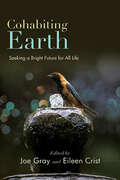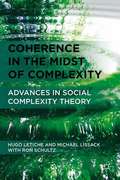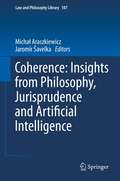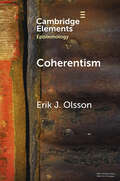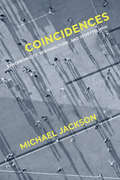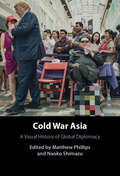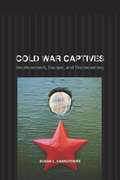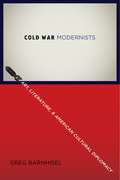- Table View
- List View
Cognitive Enhancement: Social and Public Policy Issues
by Robert H. BlankRapid advances in cognitive neuroscience and converging technologies have led to a vigorous debate over cognitive enhancement. This book outlines the ethical and social issues, but goes on to focus on the policy dimensions, which until now have received much less attention. As the economic, social and personal stakes involved with cognitive enhancement are so high, and the advances in knowledge so swift, we are likely to see increasing demands for government involvement in cognitive enhancement techniques. The book therefore places these techniques in a political context and brings the subsequent considerations and divisions to the forefront of the debate, situating their resolution within the milieu of interest group politics. The book will provide a starting point from which readers can develop a balanced policy framework for addressing such concerns.
Cognitive Media Theory (AFI Film Readers)
by Ted Nannicelli Paul TaberhamAcross the academy, scholars are debating the question of what bearing scientific inquiry has upon the humanities. The latest addition to the AFI Film Readers series, Cognitive Media Theory takes up this question in the context of film and media studies. This collection of essays by internationally recognized researchers in film and media studies, psychology, and philosophy offers film and media scholars and advanced students an introduction to contemporary cognitive media theory—an approach to the study of diverse media forms and content that draws upon both the methods and explanations of the sciences and the humanities. Exploring topics that range from color perception to the moral appraisal of characters to our interactive engagement with videogames, Cognitive Media Theory showcases the richness and diversity of cognitivist research. This volume will be of interest not only to students and scholars of film and media, but to anyone interested in the possibility of a productive relationship between the sciences and humanities.
Cognitive Ontology: Taxonomic Practices in the Mind-Brain Sciences
by Muhammad Ali KhalidiThe search for the 'furniture of the mind' has acquired added impetus with the rise of new technologies to study the brain and identify its main structures and processes. Philosophers and scientists are increasingly concerned to understand the ways in which psychological functions relate to brain structures. Meanwhile, the taxonomic practices of cognitive scientists are coming under increased scrutiny, as researchers ask which of them identify the real kinds of cognition and which are mere vestiges of folk psychology. Muhammad Ali Khalidi present a naturalistic account of 'real kinds' to validate some central taxonomic categories in the cognitive domain, including concepts, episodic memory, innateness, domain specificity, and cognitive bias. He argues that cognitive kinds are often individuated relationally, with reference to the environment and etiology of the thinking subject, whereas neural kinds tend to be individuated intrinsically, resulting in crosscutting relationships among cognitive and neural categories.
Cognitive Penetrability and the Epistemic Role of Perception (Palgrave Innovations in Philosophy)
by Athanassios RaftopoulosThis book is about the interweaving between cognitive penetrability and the epistemic role of the two stages of perception, namely early and late vision, in justifying perceptual beliefs. It examines the impact of the epistemic role of perception in defining cognitive penetrability and the relation between the epistemic role of perceptual stages and the kinds (direct or indirect) of cognitive effects on perceptual processing. The book presents the argument that early vision is cognitively impenetrable because neither is it affected directly by cognition, nor does cognition affect its epistemic role. It also argues that late vision, even though it is cognitively penetrated and, thus, affected by concepts, is still a perceptual state that does not involve any discursive inferences and does not belong to the space of reasons. Finally, an account is given as to how cognitive states with symbolic content could affect perceptual states with iconic, analog content, during late vision.
Cognitive Phenomenology (New Problems of Philosophy)
by Elijah ChudnoffPhenomenology is about subjective aspects of the mind, such as the conscious states associated with vision and touch, and the conscious states associated with emotions and moods, such as feelings of elation or sadness. These states have a distinctive first-person ‘feel’ to them, called their phenomenal character. In this respect they are often taken to be radically different from mental states and processes associated with thought. This is the first book to fully question this orthodoxy and explore the prospects of cognitive phenomenology, applying phenomenology to the study of thought and cognition. Does cognition have its own phenomenal character? Can introspection tell us either way? If consciousness flows in an unbroken ‘stream’ as William James argued, how might a punctuated sequence of thoughts fit into it? Elijah Chudnoff begins with a clarification of the nature of the debate about cognitive phenomenology and the network of concepts and theses that are involved in it. He then examines the following topics: introspection and knowledge of our own thoughts phenomenal contrast arguments the value of consciousness the temporal structure of experience the holistic character of experience and the interdependence of sensory and cognitive states the relationship between phenomenal character and mental representation. Including chapter summaries, annotated further reading, and a glossary, this book is essential reading for anyone seeking a clear and informative introduction to and assessment of cognitive phenomenology, whether philosophy student or advanced researcher. It will also be valuable reading for those in related subjects such as philosophy of mind, philosophy of psychology and epistemology.
Cognitive Plausibility in Natural Language Processing (Synthesis Lectures on Human Language Technologies)
by Lisa Beinborn Nora HollensteinThis book explores the cognitive plausibility of computational language models and why it’s an important factor in their development and evaluation. The authors present the idea that more can be learned about cognitive plausibility of computational language models by linking signals of cognitive processing load in humans to interpretability methods that allow for exploration of the hidden mechanisms of neural models. The book identifies limitations when applying the existing methodology for representational analyses to contextualized settings and critiques the current emphasis on form over more grounded approaches to modeling language. The authors discuss how novel techniques for transfer and curriculum learning could lead to cognitively more plausible generalization capabilities in models. The book also highlights the importance of instance-level evaluation and includes thorough discussion of the ethical considerations that may arise throughout the various stages of cognitive plausibility research.
Cognitive Pluralism
by Steven HorstPhilosophers have traditionally assumed that the basic units of knowledge and understanding are concepts, beliefs, and argumentative inferences. In Cognitive Pluralism, Steven Horst proposes that another sort of unit -- a mental model of a content domain -- is the fundamental unit of understanding. He argues that understanding comes not in word-sized concepts, sentence-sized beliefs, or argument-sized reasoning but in the form of idealized models and in domain-sized chunks. He argues further that this idea of "cognitive pluralism" -- the claim that we understand the world through many such models of a variety of content domains -- sheds light on a number of problems in philosophy.Horst first presents the "standard view" of cognitive architecture assumed in mainstream epistemology, semantics, truth theory, and theory of reasoning. He then explains the notion of a mental model as an internal surrogate that mirrors features of its target domain, and puts it in the context of ideas in psychology, philosophy of science, artificial intelligence, and theoretical cognitive science. Finally, he argues that the cognitive pluralist view not only helps to explain puzzling disunities of knowledge but also raises doubts about the feasibility of attempts to "unify" the sciences; presents a model-based account of intuitive judgments; and contends that cognitive pluralism favors a reliabilist epistemology and a "molecularist" semantics. Horst suggests that cognitive pluralism allows us to view rival epistemological and semantic theories not as direct competitors but as complementary accounts, each an idealized model of different dimensions of evaluation.
Cognitive Pluralism
by Steven HorstAn argument that we understand the world through many special-purpose mental models of different content domains, and an exploration of the philosophical implications.Philosophers have traditionally assumed that the basic units of knowledge and understanding are concepts, beliefs, and argumentative inferences. In Cognitive Pluralism, Steven Horst proposes that another sort of unit—a mental model of a content domain—is the fundamental unit of understanding. He argues that understanding comes not in word-sized concepts, sentence-sized beliefs, or argument-sized reasoning but in the form of idealized models and in domain-sized chunks. He argues further that this idea of “cognitive pluralism”—the claim that we understand the world through many such models of a variety of content domains—sheds light on a number of problems in philosophy.Horst first presents the “standard view” of cognitive architecture assumed in mainstream epistemology, semantics, truth theory, and theory of reasoning. He then explains the notion of a mental model as an internal surrogate that mirrors features of its target domain, and puts it in the context of ideas in psychology, philosophy of science, artificial intelligence, and theoretical cognitive science. Finally, he argues that the cognitive pluralist view not only helps to explain puzzling disunities of knowledge but also raises doubts about the feasibility of attempts to “unify” the sciences; presents a model-based account of intuitive judgments; and contends that cognitive pluralism favors a reliabilist epistemology and a “molecularist” semantics. Horst suggests that cognitive pluralism allows us to view rival epistemological and semantic theories not as direct competitors but as complementary accounts, each an idealized model of different dimensions of evaluation.
Cognitive Psychology in Early Jesuit Scholasticism
by Daniel HeiderJesuit scholastic philosophy of Francisco Suarez (1548–1617) is known to have exerted significant influence over scholastic theology in the 17th and 18th centuries. However, the historic philosophical and theological context from which his ideas emerged, marked by his Jesuit contemporaries, is not well known. In the field of philosophical cognitive psychology, especially in the commentaries on Aristotle's On the Soul, this book aims to correct this knowledge gap. Each chapter provides evidence of the theological motivation and theological horizon of the Jesuit cognitive psychology of the last decades of the 16th century and the first decades of the 17th century.
Cognitive Relativism and Social Science
by Diederick RavenModern epistomology has been dominated by an empiricist theory of knowledge that assumes a direct individualistic relationship between the knowing subject and the object of knowledge. Truth is held to be universal, and non-individualistic social and cultural factors are considered sources of distortion of true knowledge. Since the late 1950s, this view has been challenged by a cognitive relativism asserting that what is true is socially conditioned. This volume examines the far-reaching implications of this development for the social sciences.Recently, cognitive relativism has become a key issue of debate in anthropology, philosophy, and sociology. In anthropology this is illustrated by a growing awareness of the similarity of all systems of knowledge. In philosophy it is exemplified by the realization that traditional monolithic and absolutist concepts of truth have increasingly lost any power to make sense and to convince. In sociology it is visible in a renewal of interest in a general sociology of knowledge. Yet, in spite of this convergence of interests, practitioners of these three disciplines have on the whole shown no inclination to reach a consensus on the terms of reference that could facilitate an interdisciplinary approach.Cognitive Relativism and Social Science aims to do just this. It is a working assumption of this volume that, as far as the subject of cognitive relativism is concerned, anthropologists, philosophers, and sociologists should join forces rather than try to deal with the challenges of cognitive relativism within strictly imposed boundaries that normally separate academic disciplines. Only when they work together will it be possible to treat the problems posed by cognitive relativism in an adequate way. This volume provides the results of attempts to communicate on cognitve relativism across disciplinary boundaries. This is must reading in the philosophy of social science and in social research theory.
Cognitive Science: An Introduction to Mind and Brain
by Daniel Kolak William Hirstein Peter Mandik Jonathan WaskanCognitive Science is a major new guide to the central theories and problems in the study of the mind and brain. The authors clearly explain how and why cognitive science aims to understand the brain as a computational system that manipulates representations. They identify the roots of cognitive science in Descartes - who argued that all knowledge of the external world is filtered through some sort of representation - and examine the present-day role of Artificial Intelligence, computing, psychology, linguistics and neuroscience. Throughout, the key building blocks of cognitive science are clearly illustrated: perception, memory, attention, emotion, language, control of movement, learning, understanding and other important mental phenomena. Cognitive Science: presents a clear, collaborative introduction to the subject is the first textbook to bring together all the different strands of this new science in a unified approach includes illustrations and exercises to aid the student
Cognitive Science: An Introduction to the Study of Mind
by Michael J. Spivey Jay D. Friedenberg Gordon W. SilvermanCognitive Science provides a comprehensive and up-to-date introduction to the study of the mind. The authors examine the mind from the perspective of different fields, including philosophy, psychology, neuroscience, networks, evolution, emotional and social cognition, linguistics, artificial intelligence, robotics, and the new framework of embodied cognition. Each chapter focuses on a particular disciplinary approach and explores methodologies, theories, and empirical findings. Substantially updated with new and expanded content, the Fourth Edition reflects the latest research in this rapidly evolving field.
Cognitive Science: An Introduction to the Study of Mind
by Michael J. Spivey Jay D. Friedenberg Gordon W. SilvermanCognitive Science provides a comprehensive and up-to-date introduction to the study of the mind. The authors examine the mind from the perspective of different fields, including philosophy, psychology, neuroscience, networks, evolution, emotional and social cognition, linguistics, artificial intelligence, robotics, and the new framework of embodied cognition. Each chapter focuses on a particular disciplinary approach and explores methodologies, theories, and empirical findings. Substantially updated with new and expanded content, the Fourth Edition reflects the latest research in this rapidly evolving field.
Cognitive Semantics of Artificial Intelligence: A New Perspective (SpringerBriefs in Applied Sciences and Technology)
by Alexander RaikovThis book addresses the issue of cognitive semantics’ aspects that cannot be represented by traditional digital and logical means. The problem of creating cognitive semantics can be resolved in an indirect way. The electromagnetic waves, quantum fields, beam of light, chaos control, relativistic theory, cosmic string recognition, category theory, group theory, and so on can be used for this aim. Since the term artificial intelligence (AI) appeared, various versions of logic have been created; many heuristics for neural networks deep learning have been made; new nature-like algorithms have been suggested. At the same time, the initial digital, logical, and neural network principles of representation of knowledge in AI systems have not changed a lot. The researches of these aspects of cognitive semantics of AI are based on the author's convergent methodology, which provides the necessary conditions for purposeful and sustainable convergence of decision-making.
Cognitive Semiotics: Integrating Signs, Minds, Meaning and Cognition (Perspectives in Pragmatics, Philosophy & Psychology #24)
by Claudio PaolucciThis volume serves as a reference on the field of cognitive semantics. It offers a systematic and original discussion of the issues at the core of the debate in semiotics and the cognitive sciences. It takes into account the problems of representation, the nature of mind, the structure of perception, beliefs associated with habits, social cognition, autism, intersubjectivity and subjectivity. The chapters in this volume present the foundation of semiotics as a theory of cognition, offer a semiotic model of cognitive integration that combines Enactivism and the Extended Mind Theory, and investigate the role of imagination as the origin of perception. The author develops an account of beliefs that are associated with habits and meaning, grounded in Pragmatism, testing his Narrative Practice Semiotic Hypothesis on persons with autism spectrum disorders. He also integrates his ideas about the formation of the theory of mind with a theory of subjectivity, understood as self-consciousness which derives from semiotic cognitive abilities. This text appeals to students, professors and researchers in the field.
Cognitive Tutor: Custom-Tailored Pedagogical Approach (Advanced Technologies and Societal Change)
by Vinit Kumar Gunjan Jacek M. Zurada Ninni SinghThis book illustrates the design, development, and evaluation of personalized intelligent tutoring systems that emulate human cognitive intelligence by incorporating artificial intelligence. Artificial intelligence is an advanced field of research. It is particularly used in the field of education to increase the effectiveness of teaching and learning techniques. With the advancement of internet technology, there is a rapid growth in web based distance learning modality. This mode of learning is better known as the e-learning system. These systems present low intelligence because they offer a pre-identified learning frame to their learners. The advantage of these systems is to offer to learn anytime and anyplace without putting emphasis on a learner's needs, competency level, and previous knowledge. Every learner has different grasping levels, previous knowledge, and preferred mode of learning, and hence, the learning process of one individual may significantly vary from other individuals. This book provides a complete reference for students, researchers, and industry practitioners interested in keeping abreast of recent advancements in this field. It encompasses cognitive intelligence and artificial intelligence which are very important for deriving a roadmap for future research on intelligent systems.
Cognitively Inspired Audiovisual Speech Filtering: Towards an Intelligent, Fuzzy Based, Multimodal, Two-Stage Speech Enhancement System (SpringerBriefs in Cognitive Computation #5)
by Amir Hussain Andrew AbelThis book presents a summary of the cognitively inspired basis behind multimodal speech enhancement, covering the relationship between audio and visual modalities in speech, as well as recent research into audiovisual speech correlation. A number of audiovisual speech filtering approaches that make use of this relationship are also discussed. A novel multimodal speech enhancement system, making use of both visual and audio information to filter speech, is presented, and this book explores the extension of this system with the use of fuzzy logic to demonstrate an initial implementation of an autonomous, adaptive, and context aware multimodal system. This work also discusses the challenges presented with regard to testing such a system, the limitations with many current audiovisual speech corpora, and discusses a suitable approach towards development of a corpus designed to test this novel, cognitively inspired, speech filtering system.
Cohabiting Earth: Seeking a Bright Future for All Life
by Joe Gray; Eileen CristThe eco-catastrophes that we are witnessing today starkly demonstrate how the interests of the Earth's currently dominant species are in lockstep with those of nature's wider whole. Simply stated, humans and the more-than-human world have a shared fate. Just as humanity's unrestrained overreach in the ecosphere is driving a mass extinction event and causing the devastation of lifeforms and places, so it is also jeopardizing the prospect of a human future worth living. There is no "humans versus nature" tradeoff: the wellbeing of both is inseparably entwined. Solutions to the shared predicament of all Earth's beings will thus necessarily be those that strive for harmony between human presence and the rest of nature. This applies to the philosophy we adopt for agriculture, the ways in which human economies operate, our patterns of consumption, and numerous other intertwined threads of our existence. This anthology argues that harmony between humanity and our home planet must be built on the pillars of restraint, respect, and reverence.
Coherence in the Midst of Complexity
by Ron Schultz Hugo Letiche Michael LissackAdiscussion onthe social complexity approach, where dialogue and stories allow for the degrees of freedom needed for the opportunities of emergence to take root. The authors focus on the experience of coherence and how such experiential lessons differ from the establishment and maintenance of categories and labels. "
Coherence: Insights From Philosophy, Jurisprudence And Artificial Intelligence (Law and Philosophy Library #107)
by Michał Araszkiewicz Jaromír ŠavelkaThis book is a thorough treatise concerned with coherence and its significance in legal reasoning. The individual chapters present the topic from the general philosophical perspective, the perspective of legal-theory as well as the viewpoint of cognitive sciences and the research on artificial intelligence and law. As it has turned out the interchange of knowledge among these disciplines is very fruitful for each of them, providing mutual inspiration and increasing understanding of a given topic. This book is a unique resource for anyone interested in the concept of coherence and the role it plays in reasoning. As this book captures important contemporary issues concerning the ongoing discussion on coherence and law, those interested in legal reasoning should find it particularly helpful. By presenting such a broad scope of views and methods on approaching the issue of coherence we hope to promote the general interest in the topic as well as the academic research that centers around coherence and law.
Coherentism (Elements in Epistemology)
by Erik J. OlssonPerhaps the most fundamental question of epistemology asks on what grounds our knowledge of the world ultimately rests. The traditional Cartesian answer is that it rests on indubitable facts arrived at through rational insight or introspection. Coherentists reject this answer, claiming instead that knowledge arises from relations of coherence or mutual support: if our beliefs cohere, we can be sure that they are mostly true. The first part of this Element introduces the reader to the main ideas and problems of coherentism. The next part describes the 'probabilistic turn', leading up to recent demonstrations that coherence fails to be conducive to truth. The final part reassesses the current debate about the proper definition of coherence from the standpoint of Rudolf Carnap's methodology of explication. The upshot is a tentative and qualified defence of one of the early coherence measures.
Coincidences: Synchronicity, Verisimilitude, and Storytelling
by Michael JacksonMost people have a story to tell about a remarkable coincidence that in some instances changed the course of their lives. These uncanny occurrences have been variously interpreted as evidence of divine influence, fate, or the collective unconscious. Less common are explanations that explore the social situations and personal preoccupations of the individuals who place the most weight on coincidences. Drawing on a variety of coincidence stories, renowned anthropologist Michael Jackson builds a case for seeing them as allegories of separation and loss—revealing the hope of repairing sundered lives, reconnecting estranged friends, reuniting distant kin, closing the gap between people and their gods, and achieving a sense of emotional and social connectedness with others in a fragmented world.
Cold War Asia: A Visual History of Global Diplomacy
by Matthew Phillips Naoko ShimazuThis innovative, interdisciplinary and international collection of essays offers fresh perspectives on the history of global diplomacy. Experts in history, international relations, art history and performance art have come together to examine a series of visual sources relating to Asia's role in global diplomacy during the Cold War. They explore how leaders, including Indonesia's Sukarno, the Philippines' Imelda Marcos and Thailand's King Bhumibol, exploited the symbolic value of diplomacy to emphasise their agency in relationships with Great Powers. These case studies demonstrate the significance of Asian diplomacy in understanding the Cold War, shifting away from the use of 'war' as the dominant criterion for analysis of the region. Cold War Asia sheds critical light onto how culture shapes international relations, widening the lens of analysis to embed the role of gender, religion, and ethnicity, as well as the material world, into our understanding of diplomacy.
Cold War Captives: Imprisonment, Escape, and Brainwashing
by Susan L. CarruthersThis book explores the ways in which east-west disputes over prisoners, repatriation, and defection shaped popular culture. Captivity became a way to understand everything from the anomie of suburban housewives to the "slave world" of drug addiction.
Cold War Modernists: Art, Literature, and American Cultural Diplomacy
by Greg BarnhiselCold War Modernists documents how the CIA, the State Department, and private cultural diplomats transformed modernist art and literature into pro-Western propaganda during the first decade of the Cold War
